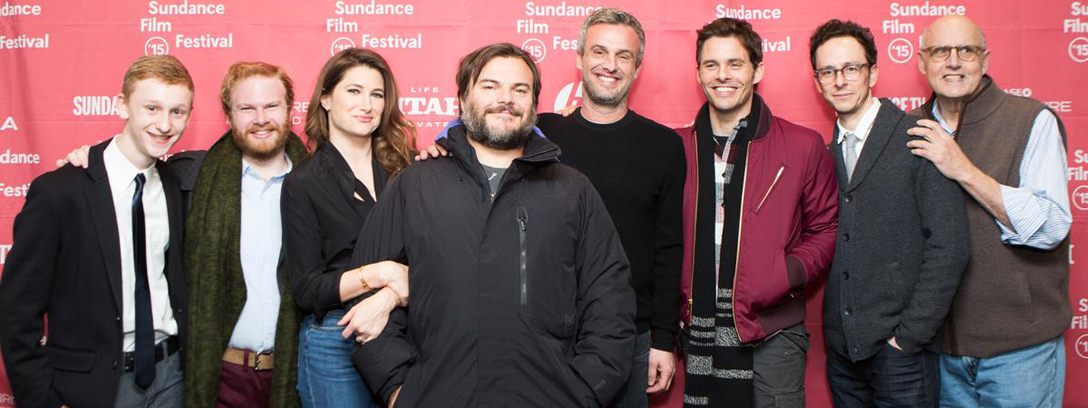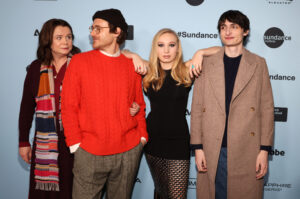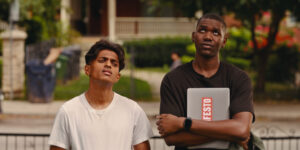The cast and filmmakers of “The D Train.” ©Sundance Institute | Ryan Kobane
Sundance Institute
Sundance.org is dispatching its writers to daily screenings and events to capture the 10 days of festivities during the Sundance Film Festival in Park City, Utah. Check back each morning for roundups from the previous day’s events.
The D Train
by Jeremy Kinser
The crowd-pleasing The D Train offers a bawdy and frequently surprising look at the cult of celebrity that takes bromance to the next level and features a pair of no-holds-barred performances by Jack Black and James Marsden that rank with their best work. Screenwriters Andrew Mogel and Jarrad Paul make their joint directorial debuts with the subversive comedy which premiered Friday night in the U.S. Dramatic Competition.
Black stars as Dan Landsman, a small-town high school reject who concocts a scheme to become a local hero by luring Oliver Lawless, the most popular kid in his class (Marsden) back to their upcoming 20-year reunion. When Dan travels to Hollywood to meet his former classmate for a drink, he spins a web of lies as his seduction plan goes awry in an unexpected way that threatens Dan’s family and career and results in a jaw-dropping conclusion.
During the post-screening Q&A, Mogel and Paul insisted their screenplay isn’t fact-based. “We just wrote this character who was so desperate and looking for the popular guy,” Paul revealed. “It didn’t come from anything personal.”

Black generated more laughter from the audience when he said his own high school reunion was less eventful than the one seen on screen and that it was the clever screenplay that drew him to the project. “I just loved the script,” he said. “It made me laugh so hard. I loved how surprised I was by the twists and turns and so many things I’d never seen done before in a comedy. I was interested in the desperation of the character. I feel that I know that, not just in myself but in other people.”
Told by an audience member that his performance here was perhaps his best yet and contained some of the swagger of Warren Beatty’s libidinous character in Shampoo, Marsden seemed to blush at the compliment before shifting the attention back to Paul and Mogel.
“As an actor it’s so nice to have all the work laid out for me,” Marsden shared. “In comedies you feel like you’ve seen it all, but this was so subversive and such an interesting character for me and under their guidance we just played every day.”
The End of the Tour
by Eric Hynes
Judging from conversations and Twitter activity in the moments before the world premiere screening of The End of the Tour, there was as much trepidation as there was excitement about the prospect of the life of the late, great author David Foster Wallace being dramatized on film. Yet even though the film, and actor Jason Segel in particular, made great pains to evoke Wallace’s singular way of talking, thinking, and being, it turned out that The End of the Tour is far from a biopic—it documents just a few days at the end of the author’s press tour for Infinite Jest—and rather uses writer David Lipsky’s best-selling account of his time reporting an ultimately unpublished profile of Wallace for Rolling Stone Magazine as a jumping off point for a rumination on fame, American manhood and loneliness, among many other things. It’s also, despite a bigger budget and stars like Segel, Jesse Eisenberg, and Joan Cusack, very much a deeply felt James Ponsoldt (Smashed, The Spectacular Now) film.
“I’m a massive David Foster Wallace fan. I read Infinite Jest as I was going into college and proceeded to read everything I could get my hands on. I had some of his writing read at my wedding, so it’s very near and dear to me,” Ponsoldt said after the screening. “Donald [Margulies, the screenwriter] was actually my playwriting professor at college, and when he reached out and said he’d written this script, I was thrilled and very nervous to read it. And it just moved me to my core.”
“One of the things that attracted me to David Lipsky’s memoir is that to me it became a universal story of artists who struggle, and artists who achieve, and the conundrum of success when you’re an artist,” added Margulies. “The fact that it was David Foster Wallace, one of the most compelling figures of American letters of our time, was certainly a very thrilling aspect of it. But what I also saw in Dave and David, was this kind of doppelganger, two very bright, very complicated guys bumping up against each other over the course of an abbreviated period of time, and encapsulated in those days was friendship, competition, so many conflicting things about the nature of art, the publicizing of art, and how do people reconcile that?”
Though he’s better known for writing plays, Margulies said that he “felt that writing this as a two-hander for the stage would not do it justice. I was very compelled by the idea of placing David Foster Wallace, one of the great chroniclers of American culture, on the American landscape, was a thrilling idea. The fact that he’s in a car, on highways, stopping for fast food, and going to the Mall of America. I thought this is just too fantastic,” he said.
©Sundance Institute | Stephen Speckman
To play the part, Segel said he immersed himself in all things David Foster Wallace, but that he also accessed a bit of himself. “I had access to the tapes, and I had David Lipsky’s book, I had Donald’s screenplay, and there were a lot of interviews that I got to watch and listen to, and then I read and read and read,” he said. “I started a book club in the little town that I live in, outside of L.A., with three really great book dorks who had read Infinite Jest like 5 or 6 times. And we talked through it. One of the things that’s so special about David Foster Wallace’s writing is that he touches on some very universal human feelings, and so I tried to really pay attention to the parts of us that are the same.”
It was a night to celebrate David Foster Wallace, but also to take stock of what it meant for Ponsoldt to return for the third time to the Festival, and with a film as high profile as The End of the Tour. “In the old days, they just moved on from here, to something else,” Festival Director John Cooper said before the screening. “I really love that this community of creating independent film is something that’s real now, it’s something that they can stay in, and we all get to prosper from that.”
Christmas, Again
by Eric Hynes
Soon after director Charles Poekel moved to New York, he noticed a local phenomenon that would become the genesis of his first film. It was early winter, and the pop-up Christmas tree stand in his neighborhood never seemed to shut down. “I think I was buying a tree at like midnight, and asked ‘are you guys open’?,” Poekel said during a post-screening Q&A. “And he was like, ‘we don’t close, what are you talking about?’ He looked at me like I was crazy.” Now, many years later, Poekel is in Sundance with Christmas, Again, a delicate, moving, achingly poetic valentine to the strange existence of the seasonal vendor. It stars Kentucker Audley as a man who’s using the oblivion of the overnight shift as a way to cope with a breakup, and weather the storm of the holidays.

“I actually opened up a Christmas tree stand to research this—to write the screenplay, and to use the money to fund the film. I did this for a couple of years before we actually got it off the ground,” Poekel said. And then when it came time to shoot—over 15 frigid days on the streets of Greenpoint, Brooklyn, “We were selling trees while we were shooting. Pretty much everyone here sold a tree at some point,” he said, motioning to the gathering of cast and crew. Later on, some in the crew admitted to enjoying the hustle and salesmanship. It’s likely that Christmas, Again is the first Sundance film to be partly funded by the sales of Christmas trees.
“As an actor there’s a lot of down time,” joked Audley. “It was invaluable research, and hopefully that added to the naturalism.” Sometimes customers were recruited for on-camera scenes, and walk-on parts were generally casually cast throughout the neighborhood. “Literally some of the people were cast the night or day before. But it made sense that everyone who came to be involved was involved,” said casting director Eléanore Hendricks. “There was this strange harmony with this film.”
Best of Enemies
by Jeremy Kinser
Best of Enemies is a rollicking clash of the intellectual titans that reconstructs the explosive rhetorical battle between conservative William F. Buckley Jr. and liberal Gore Vidal. The two great public thinkers of their era were hired by ABC, desperate for ratings, to participate in a series of nationally televised debates during the 1968 presidential conventions. The explosive tête-à-tête changed television news forever and gave birth to pundit television as we know it today. The film, co-directed by Robert Gordon and Morgan Neville (whose Twenty Feet From Stardom premiered at the festival in 2013 before going on to win the best documentary Oscar), is screening in the U.S. Documentary Competition.

©Sundance Institute|Azikiwe Aboagye
Gordon and Neville take viewers on a lightning-paced and nostalgic time trip as Buckley and Vidal go at each other like heavyweight champs. The two erudite, quick-witted sophisticates sometimes sparred over policy and but just as often it devolved into personal insult, each vying to show America that he was the better person. The directors use archival footage, interviews with family members, some of today’s most noted thinkers, such as Andrew Sullivan and the late Christopher Hitchens, along with excerpts read by Kelsey Grammer (a noted Republican) for Buckley and John Lithgow for Vidal.
As the film’s title suggests, Buckley and Vidal seemed to truly despise one another and believed each other’s political ideologies were dangerous for the country. Yet each seemed to be the only one learned enough to adequately appreciate the talents of his opponent. The debate culminated with Vidal calling his opponent a “sort of crypto-Nazi.” Buckley retaliated with “Listen, you queer. Stop calling me a crypto-Nazi or I’ll sock you in the goddamn face and you’ll stay plastered.” The usually unflappable Buckley was horrified that he’d lost his cool in public, the debate was over and Vidal was the victor.
During the Q&A that followed the screening, more than one question from the audience wondered why Buckley had been so defeated by remarks that are considered tame by today’s standards.
“He had a persona and you get the sense that Buckley wasn’t quite the character he played on TV but that character was hugely important to him,” Neville answered. “It was a moment that shattered the facade he’d kept up so long. He would never mention Vidal for the rest of his life. It was a really sore subject and that never changed.”
Strangerland
by Nate von Zumwalt
As a rule, tragedy tends to have its many ruthless ways. In Strangerland, Kim Farrant’s taut and cerebral directorial debut, that standard rings true as Catherine (Nicole Kidman) and Matthew Parker’s (Joseph Fiennes) two children vanish into the unforgiving Australian desert. Forced to grapple with the fallout and unable to evade lingering suspicions pointing to their own culpability, the couple’s already fragile relationship descends into a perilous spiral, pitting Matthew’s inward-facing coping tendencies against Catherine’s increasingly volatile behavior.

©Sundance Institute | Ashley Lindsey
Farrant’s ambitious first effort, which premiered in World Dramatic Competition, succeeds most deeply in its ability to confront – with an almost psychoanalytical lens – the inexactness of our reactions to loss. Farrant cited the tragedy in her own life following the death of her father at a young age, and a subsequent interest in “the behaviors that I went into, and how I dealt with that, or didn’t deal with it.” She continued, “I’m kind of fascinated by how we act out when life’s punishing us. For me it was around connecting and the urge to make love or be sexual or something to feel anything other than the horrific pain.”
Speaking about her role, Kidman was more guarded in describing how she channels the seemingly endless layers of complexity that define a character like Catherine Parker. “It’s so personal, that to dissect it like this – it’s kind of the work, and I leave it,” she said. ““I only saw the movie for the first time tonight, so I’m a little bit in shock myself.” That sentiment suffused the Egyptian Theater Friday night, as Strangerland’s dedication to rawness – be it emotional, dramatic, or behavioral – left more than just Kidman speechless.
Ultimately, Farrant appeared to be the most comfortable audience member in the room, and she spoke with a tinge of mystery when fielding questions about the film’s ending. “We were committed to leaving you how the parents were left.”
10 Days of Independence
We’re celebrating 10 Days of Independence at the Sundance Film Festival with 10 Sundance Institute Members. Check the Daily Roundup to meet a new member each day and find out what they’re here to see, what they’re talking about and what Sundance film character they want to compete against in a dance-off. Most likely, you’ll find them to be a reflection of the organization they support – independent and inspiring.

You can celebrate 10 Days of Independence too. Join Sundance Institute today at sundance.org/join. Today’s member of the day is Chris E. from Los Angeles.
What are you excited to see?
I like music and documentaries…What Happened, Miss Simone? and Montage of Heck. And also Going Clear: Scientology and the Prison of Belief.
Which Sundance filmmaker would you hope to share a shuttle with?
Zellner Bros.
What’s your favorite Sundance movie?
Too many to have one favorite! You Can Count On Me, Little Miss Sunshine, Napoleon Dynamite, Winter’s Bone, Senna, Beasts of the Southern Wild, Searching for Sugar Man, Dogtown and Z-boys.
Why are you a Sundance member?
I love great movies!
Which favorite Sundance film character would you want to compete against in a dance-off?
Napoleon Dynamite might be the standard answer, but I think I would prefer Hushpuppy.







